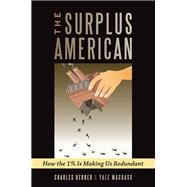
Note: Supplemental materials are not guaranteed with Rental or Used book purchases.
Purchase Benefits
Looking to rent a book? Rent Surplus American: How the 1% is Making Us Redundant [ISBN: 9781612052502] for the semester, quarter, and short term or search our site for other textbooks by Derber,Charles. Renting a textbook can save you up to 90% from the cost of buying.
| You're Fired-The Essay | p. 1 |
| Americans as a Surplus People | p. 3 |
| Who Are the Surplus People? | p. 7 |
| How to Make Money from the Creation of Surplus People | p. 13 |
| The Four Roots of Surplus People Production | p. 17 |
| How Many Surplus People Are There in the United States? | p. 23 |
| Introducing the History of Surplus People | p. 25 |
| How Capitalism Created Surplus People Right from the Very Beginning | p. 27 |
| How the First Truly Industrial Society, Britain, Used Surplus People | p. 30 |
| How American Capitalists Controlled the Surplus Population before World War I | p. 31 |
| World War I and the Roaring Twenties | p. 34 |
| The Great Depression Begins | p. 37 |
| Roosevelt, Keynes, and the New Deal | p. 39 |
| America at Its Height | p. 45 |
| America Enters Decline | p. 51 |
| The Age of Reagan | p. 56 |
| Does Our Theory Hold Up? | p. 63 |
| What to Do? The Tea Party and the Occupy Movement | p. 71 |
| The Tea Party and the Dangerous Politics of Reaction | p. 73 |
| The Occupy Movement and the Politics of Hope | p. 77 |
| The Past and Future of the Occupy Movement | p. 79 |
| Why a Play Is an Effective Way to Discuss Politics and Economics | p. 94 |
| Notes | p. 101 |
| I Like Firing People-The Play | p. 111 |
| I Like Firing People-A Version Performed at Boston College | p. 189 |
| Index | p. 221 |
| About the Authors | p. 227 |
| Table of Contents provided by Ingram. All Rights Reserved. |
The New copy of this book will include any supplemental materials advertised. Please check the title of the book to determine if it should include any access cards, study guides, lab manuals, CDs, etc.
The Used, Rental and eBook copies of this book are not guaranteed to include any supplemental materials. Typically, only the book itself is included. This is true even if the title states it includes any access cards, study guides, lab manuals, CDs, etc.